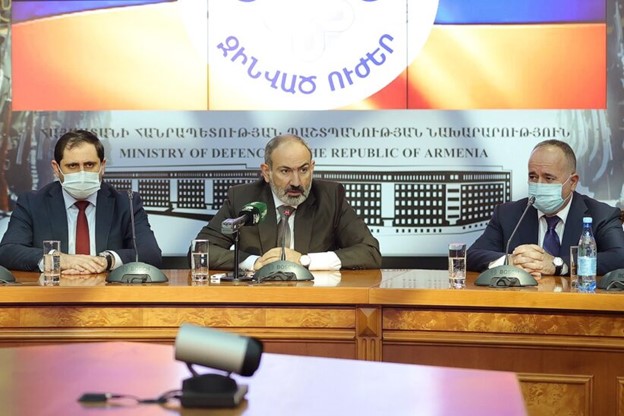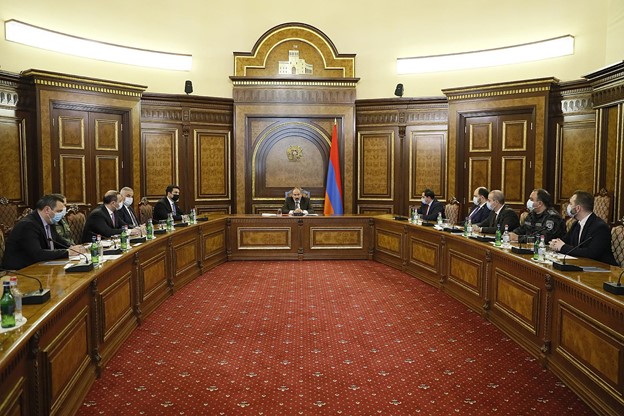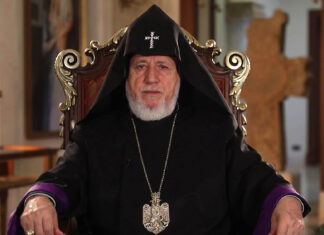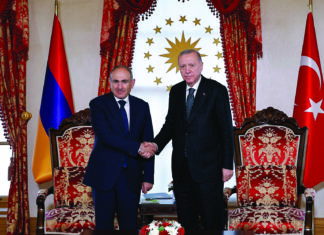YEREVAN – Armenian President Armen Sarkissian signed a decree dismissing Defense Minister Arshak Karapetyan on Monday morning, November 15, on recommendation from Prime Minister Nikol Pashinyan. The move follows reports of yet another attempt by Azerbaijani forces to penetrate the Armenian border in Syunik Province.

According to the Ministry of Defense, Armenian and Azerbaijani forces have been engaged in a series of intense firefights over the weekend near Syunik’s Ishkhanasar area, directly adjacent to occupied Karvajar, which was transferred to Azerbaijani control following last year’s ceasefire. Videos emerged on the internet on Sunday, November 14 purportedly showing Azerbaijani soldiers negotiating with Armenian servicemen in Armenian positions, some at least 1.5 km (1 mile) inside sovereign Armenian territory. Others showed Azerbaijani infantry fighting vehicles in the distance, apparently advancing towards Armenian trenches.
This incident comes at a time of increased border tension between Armenia and Artsakh. Last week, Azerbaijan announced that it would be installing customs checkpoints on the small 3 km length of road it controls along the Goris-Kapan road, effectively blocking it to local traffic. This move has been interpreted by many analysts, as well as Prime Minister Nikol Pashinyan, within the context of increasingly desperate attempts by Baku to put pressure on Yerevan to sign a peace treaty on their terms before Armenia completes its post-war recovery. Armenia has so far resisted attempts to start border demarcation or accept a loss of status for Artsakh. Armenia has responded by building a series of new by-pass roads across Syunik province to secure domestic and international traffic.
The presence of light armored vehicles was denied by the Ministry of Defense on Sunday, though it did acknowledge that Azerbaijanis had “attempted to capture Armenian positions” without specifying their fate. The ministry did insist that no Armenian soldiers were killed or wounded during the incident and that Russian peacekeepers were on site to help de-escalate the situation.
Still, news of Karapetyan’s sacking as defense chief prompted questions regarding the events which unfolded the previous day. Karapetyan, who served in the role for just over 100 days had ironically been appointed to the position under similar circumstances, coinciding with a fatal shootout on the border near the town of Yeraskh in July. A long-serving career officer, Karapetyan left the Army to become defense advisor to Nikol Pashinyan following the revolution. Thought to be one of the prime minister’s trusted advisors, and known for close ties to the Russian defense community, he was promoted to minister of defense as part of the new cabinet formed after last June’s election. Karapetyan also triggered a minor diplomatic incident last week when he travelled to Stepanakert to meet with his Artsakhian counterpart, provoking the ire of Baku.
Pashinyan confirmed that Karapetyan’s dismissal was directly related to the weekend’s border incident in a televised meeting of the Security Council on Monday morning. “ I invited Mr. Karapetyan in the morning to thank him for his work as minister of defense,” the prime minister announced, adding that he appreciated his efforts but that a change in leadership was necessary to better deal with this crisis. Karapetyan was replaced in the role by Suren Papikyan, currently serving as deputy prime minister.








